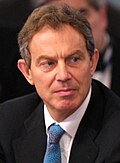This article includes a list of general references, but it lacks sufficient corresponding inline citations .(March 2025) |
| |||||||||||||||||||||||||||||||||||||||||||||
All 32 London boroughs, all 36 metropolitan boroughs, 18 unitary authorities, 88 English districts and 7 directly elected mayors | |||||||||||||||||||||||||||||||||||||||||||||
|---|---|---|---|---|---|---|---|---|---|---|---|---|---|---|---|---|---|---|---|---|---|---|---|---|---|---|---|---|---|---|---|---|---|---|---|---|---|---|---|---|---|---|---|---|---|
| |||||||||||||||||||||||||||||||||||||||||||||
 Colours denote council control following elections, as shown in the main table of results. | |||||||||||||||||||||||||||||||||||||||||||||
The 2002 United Kingdom local elections were held on Thursday 2 May 2002. All London borough council seats were elected as well a third of the seats on each of the Metropolitan Boroughs. Many unitary Authorities and District councils also had elections. There were no local elections in Scotland, Wales or Northern Ireland. This was the last time that Labour was the majority in local government until 2023.


